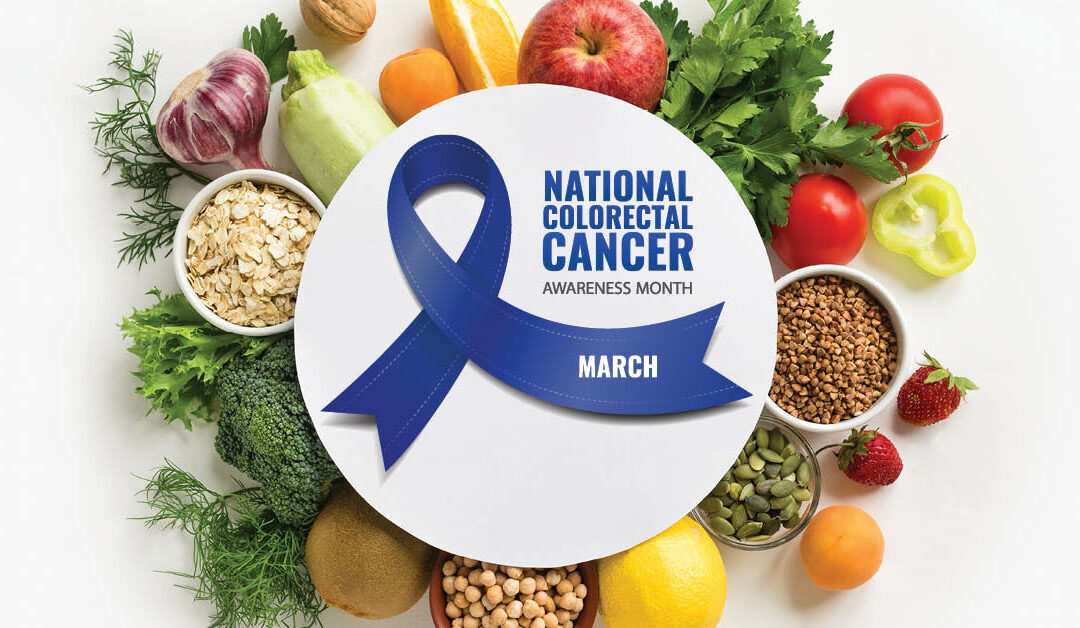Colorectal cancer is the third most common cancer in the United States. There are many factors that can increase your risk of developing colorectal cancer: old age, type 2 diabetes, a history of colorectal polyps, inflammatory bowel disease, inheritable syndromes, or those of African American or Jews of Eastern European descent. Additionally, there are lifestyle-related factors that are linked to colorectal cancer. However, these are risk factors that you can change.
 While there has been a decrease in incidence and mortality rate due to effective cancer screening, there’s been an increase in the number of younger patients being diagnosed with colon cancer. It is thought that lifestyle and behavioral factors, such as obesity, may be a possible cause. The American Institute for Cancer Research (AICR) estimated that half of all colorectal cancer cases are preventable if people were to eat healthier diets, move more, and stay lean. AICR has also found that consuming processed meats, high amounts of red meat, and drinking 2 or more alcoholic drinks daily are causes of colorectal cancer. Let’s explore the tips on how to decrease your modifiable risk factors.
While there has been a decrease in incidence and mortality rate due to effective cancer screening, there’s been an increase in the number of younger patients being diagnosed with colon cancer. It is thought that lifestyle and behavioral factors, such as obesity, may be a possible cause. The American Institute for Cancer Research (AICR) estimated that half of all colorectal cancer cases are preventable if people were to eat healthier diets, move more, and stay lean. AICR has also found that consuming processed meats, high amounts of red meat, and drinking 2 or more alcoholic drinks daily are causes of colorectal cancer. Let’s explore the tips on how to decrease your modifiable risk factors.
Tip #1: Decrease your intake of red meats
The World Cancer Research Fund concluded that red meat increases the colorectal cancer risk. It is found that the risk increases with eating high amounts (over 18 ounces per week) of red meat (beef, veal, goat, pork, lamb). Hint: the size of your palm or a deck of cards equals 3 ounces.
Instead: Eat more chicken, turkey, fish, and plant-based protein (beans, nuts, peanut and legumes)
Tip #2: Limit your intake of processed meats
Processed meats are meats that are smoked, cured, salted, or preserved with added chemicals. Examples of these include sausage, bacon, corned beef, beef jerky and deli meats. The World Cancer Research Fund found that the risk of colorectal cancer is increased by 18% in those eating 50 grams of processed meats per day. That is just one hot dog or a few slices of bacon.
Tip #3: Limit alcohol
Studies have shown a 7% increase in the risk of developing colorectal cancer per 10 gram of alcohol per day. The World Cancer Research Fund found that about two drinks per day has a strong correlation towards colorectal cancer.
Tip #4: Add dairy products to your diet
Current evidence suggests that dairy consumption (milk, yogurt, cheese and dietary calcium) can decrease the risk of colorectal cancer with higher consumption.
Tip #5: Increase your intake of fiber and whole grains
Evidence shows that there’s a significant decreased risk for developing colorectal cancer when consuming more whole grains and fiber. Recent research found a 10% decreased risk for colorectal cancer per additional 10 grams per day of total dietary fiber intake. Current dietary guidelines recommend that the intake of fiber is 25 grams per day for women and 38 grams per day for men.
How to increase fiber intake: Eat more whole fruits and vegetables, whole wheat bran flakes, shredded wheat cereal, oatmeal, whole wheat bread, wrap and/or pasta, beans, lentil, legumes, garlic, popcorn, brown rice, grains like barley, bulgur, buckwheat and quinoa.
Tip #6: Increase your physical activity
There’s strong evidence that proves that being physically active protects against colorectal cancer. Those engaged in higher levels of physical activity had a 16% decreased risk of developing colon cancer as compared to those who were least physically active. Evidence suggests that physical activity after a colorectal cancer diagnosis is associated with a 30% lower risk of death from it. Current recommendations suggest at least 30 minutes a day of physical activity.
Tip #7: Maintain a healthy weight
Colorectal cancer risk is increased with higher BMI and increases more when the BMI is higher than 27. Greater body fatness (marked by BMI, waist circumference or waist-hip ratio) is strongly linked to colorectal cancer. The risk increases by 2-3% per unit increase of BMI and per inch increase of waist circumference.
To schedule an appointment for a colorectal cancer screening contact our Primary and Specialty Care Center at 973-877-5080.


